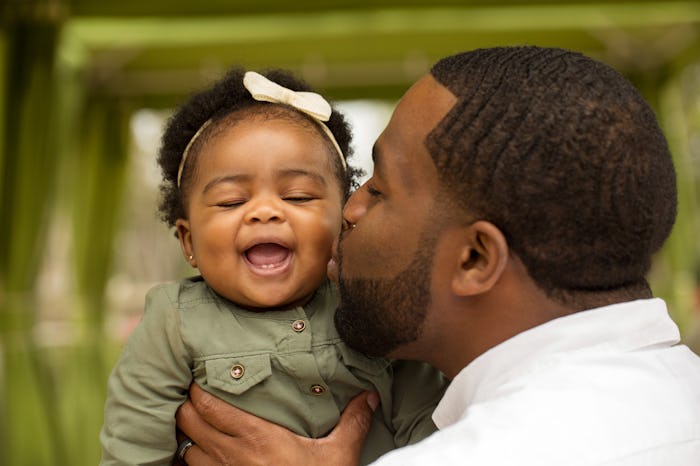Life

Here's When Babies Start Saying 'Dada'
Parenthood is full of dichotomy, as you learn from the get-go: You can't wait for your babies to reach the next milestone and yet at the same time, you wish they would stay tiny forever. One of the most anticipated of all milestones, of course, is language. And since babies notoriously prefer mom to meet most of their needs in that first year of life, dads can be anxious for any sign of attachment. So when do babies say "dada," and does it really mean they want their father?
According to Rebecca Ingram Rowe, Speech-Language Pathologist and owner of ACT Speech Therapy in Charlotte, babies start babbling between 4 and 6 months of age with the sounds P, B, and M. In an exclusive interview with Romper, Rowe explains that "these may sound like real words, but babies are just exploring their oral musculature. At 7 months to 1 year old, babies start using series of sounds that have a more communicative meaning."
So if your 4-month-old is looking at you and saying "ma," don't start rubbing it in your partner's face just yet. She's not exactly expressing her undying devotion to you; she just likes the way her muscles feel in her mouth and finds the M sound easy to make.
And what about the D sound? — every daddy wants to know. Jann Fujimoto, Speech-Language Pathologist and owner of SpeechWorks in Oconomowoc, Wisconsin, says dads can expect to hear their favorite syllable beginning at 6 months old. Fujimoto tells Romper that if a baby offers a consistent label to a person (or object), then it can be considered a word.
Bottom line, says Fujimoto: If dog, dad, and bottle are all indicated by "dada," then it doesn't count as a real word, it's just really cute. But when "da" or "dada" is used to mean daddy and daddy alone, then it's time to break out the streamers and party, because baby's saying his first word.
Regardless of whether your baby says "mama" or "dada" first, the sound of him identifying one of you will be sure to melt you both. And one day, in keeping with the dichotomy of parenthood, you'll both find your exhausted ears pining for the time when she wasn't saying anything quite so much.